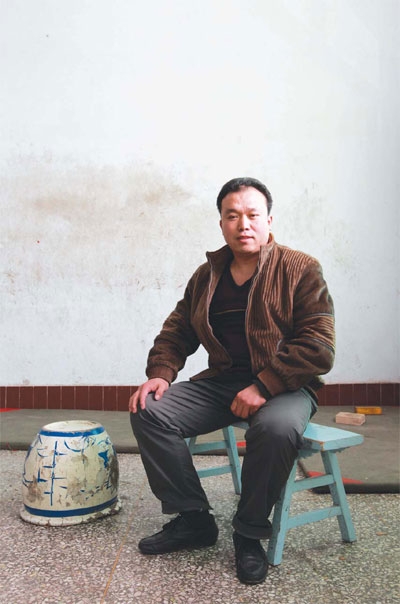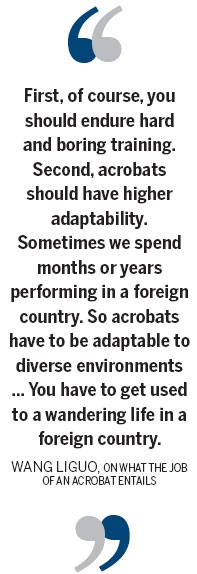It's all in the family
Updated: 2011-04-01 10:55
By Lin Jing (China Daily European Weekly)
Four generations of acrobats have weathered the changes with devotion to leave a rich legacy
In Wuqiao County, there is a saying that "either the elder or the child, everyone is a master of acrobatics". Wang Liguo's family is one such living example of this statement. "My grandfather, my father, my uncle, myself and my cousin, my older female cousin, and my niece, are all engaged in acrobatics, in the past or at present," says the 37-year old Wang.
|
 Four generations of Wang Liguo's family have been devoted to acrobatics. Gao Erqiang / China Daily
|
"Four generations of my family have been devoted to acrobatics." With such a rich legacy behind him, it was only natural that Wang was influenced by the family choice when he had to decide upon a career.
In the 1930s, acrobatics was still a family business. Wang's grandfather took Wang's father and uncle to perform acrobatics in rural areas with a shoulder pole carrying props and costumes.
When Wang was a child, his father became an acrobat who performed rope shows in a local troupe. From time to time, little Wang went to the troupe and watched these performances.
Being one of the first students at Wuqiao Acrobatic Art School, Wang started acrobatics training at 10 and spent six unforgettable years there.
"In the 1980s, we did not have such good facilities as a big training center, wooden floors and heating," says Wang. "During winter, we would often sweep the heavy snow in the open field, do somersaults and also stand upside down. Often our hands would get hurt by the hard cement floor."
If they did not behave or were lazy, they would be punished by teachers.
"It was the nature of acrobatics: You have to suffer a lot to master basic skills like pressing legs and stretching ligaments in the first three years. Without a solid foundation, you could not learn anything."
After six years of school training, he mastered an exclusive skill called juggling cylinder, in which he uses his forehead to play with a big cylinder.
He showed his forehead, above which is a bald patch. "Several years of training has led to this," he says.
He, however, admits that learning the requisite skills took longer than he expected. "It takes at least three years to master this program, while for others, it would be around one to two years."
Wang used to perform for a local acrobatics troupe and has rich world wide performing experience, especially in Europe.
"I have been to 30 countries and almost all over Europe," he says.
Wang says in France, people love to see performances that are breathtaking and exciting, like the "high chair", in which the acrobat does a handstand on top of 11 chairs and makes different gestures, without any protection wire.
"The audience loved this program and were often tense while watching the performance."
|
 |
"Even a small movement or an expression in the eyes on the stage would draw their applauses."
As an experienced acrobat, Wang says acrobatics is a job that requires many special traits.
"First, of course, you should endure hard and boring training. Second, acrobats should have higher adaptability," he says.
"Sometimes we spend months or years performing in a foreign country. So acrobats have to be adaptable to diverse environments."
"Sometimes we go to the US, where the weather is good; and sometimes to Russia, which has extreme cold weather; sometimes we travel for a month, and sometimes for a whole year; sometimes we go out independently and sometimes in a big group."
"You have to get used to a wandering life in a foreign country," says Wang.
The longest stay Wang ever experienced was in Spain, when their team performed in 14 five-star resort hotels across different islands in Spain.
"In Spain, every resort hotel has a small stage. And each day we performed in a different hotel and went through 14 hotels one by one, for two and a half years," he says.
Wang likes the working and living environment in Spain and is a frequent visitor to the Spanish shores.
In China, many acrobats emigrated to other countries after retirement. But Wang has no such plans.
"For me, friends and family are more important than anything else," says Wang.
"After all, this is my hometown. I can get together with my relatives and friends from time to time."
For Wang, acrobatics means more than a job, but a family tradition, which, obviously, he would like to be inherited.
He has a daughter aged 12, who is going to junior high school this year.
Wang would like his daughter to study choreography after junior high school and be a stage director in the future.
"She likes dancing and singing and, nowadays a stage director is of great importance to acrobatics performances," says Wang.
Wang says a good stage director decides the music, costume and entire style of an acrobatic performance. "The director could make acrobatics full of vigor and vitality, or else it may turn out to be dull and boring."
"I hope my daughter can also be in the business, and make Chinese acrobatics more popular in the world."
E-paper

Green mission
Tony blair believes China will take a leading role to fight climate change and cut emissions.
Stepping on to success
French connection
Generation gaps
Specials

Have you any wool?
The new stars of Chinese animation are edging out old childhood icons like Mickey Mouse and Hello Kitty.

Fill dad's shoes
Daughter and son are beginning to take over the family business of making shoes.

Virtual memorial
High-Tech touches to traditional tombsweeping festival help environment.
